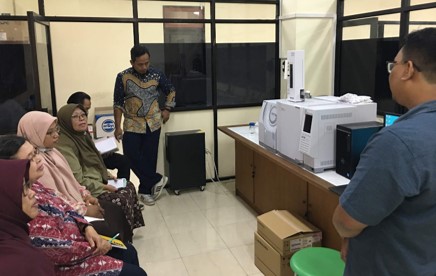Gas Chromatography-Mass Spectrometry (GC-MS) Technical Training
Primary tabs

The Department of Chemistry Education, Faculty of Mathematics and Natural Sciences, University of Yogyakarta (UNY), held a technical training session on the use of the Gas Chromatography-Mass Spectra (GC-MS) instrument for lecturers in the Chemistry Study Program. The training took place in the Instrumentation Laboratory of the Department of Chemistry Education, Faculty of Mathematics and Natural Sciences, University of Yogyakarta, from August 28 to 29, 2024. This training aimed to introduce lecturers specifically engaged in research fields that utilize this instrument to the use of the new GC-MS instrument. Since August 2024, the Department of Chemistry Education has acquired a new research instrument, the GC-MS. The arrival of this GC-MS instrument has been a breath of fresh air for lecturers in the Chemistry Study Program, enabling them to accelerate their research and facilitate its immediate dissemination to the community. Gunawan T., a GC-MS technician, presented and explained the various components of the GC-MS and how to operate the instrument.
Dr. Retno Arianingrum stated that the GC-MS serves as a research support instrument within the Department of Chemistry Education and is intended to motivate lecturers to be more enthusiastic in conducting research. In addition, the presence of this GC-MS will accelerate the research of students' final assignments so that the Department of Chemistry Education can produce graduates on time. This instrument is not only prioritized for internal research activities within the Department of Chemistry Education, FMIPA-UNY, but will also open opportunities for researchers outside the department and even other universities to be able to enjoy this facility. Indirectly, this certainly supports the acceleration of chemical research in Indonesia. "It is possible that the presence of this GC-MS can open opportunities for the academic community in the Department of Chemistry, FMIPA-UNY to increase research collaborations with national and international institutions" (Retno Arianingrum).
